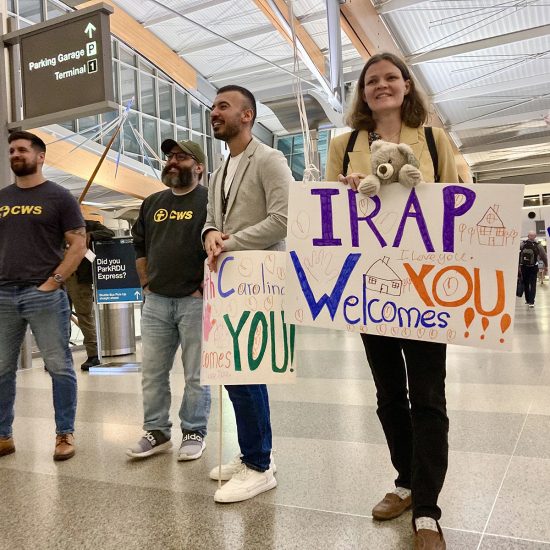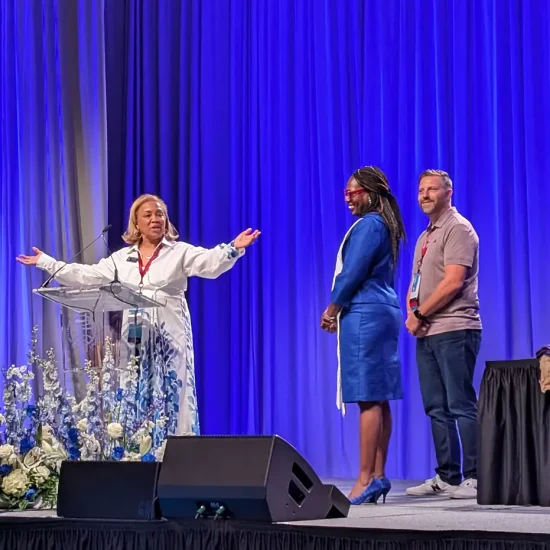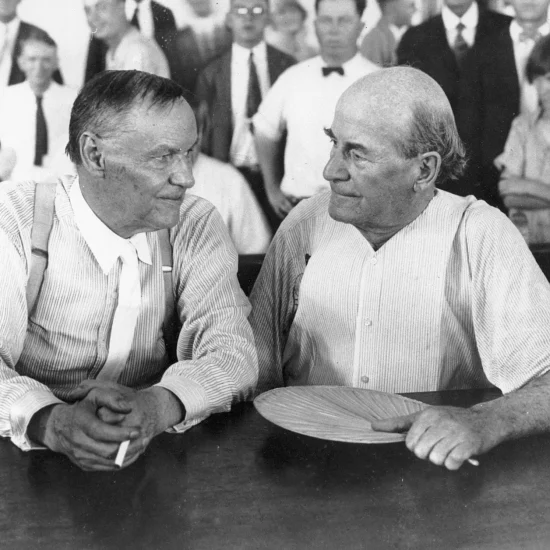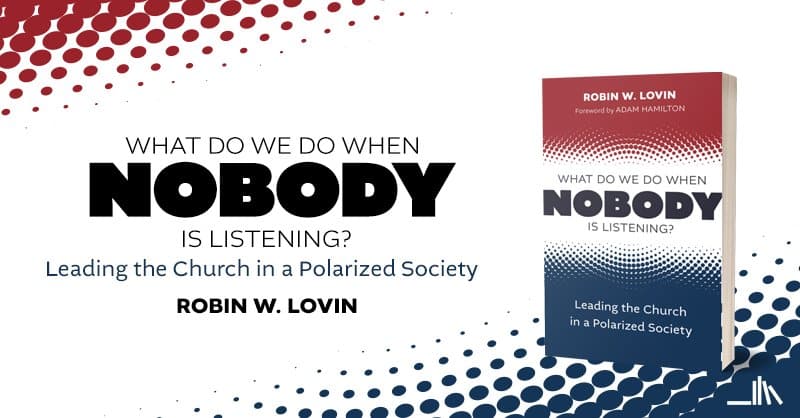
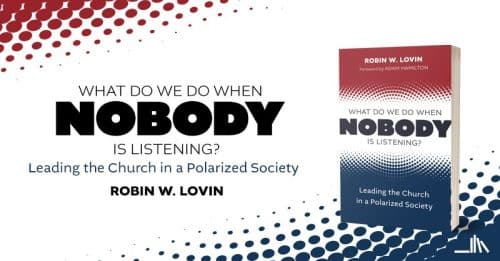
WHAT DO WE DO WHEN NOBODY IS LISTENING? Leading the Church in a Polarized Society. By Robin W. Lovin. Foreword by Adam Hamilton. Grand Rapids, MI: Wm. B. Eerdmans Publishing Company, 2022. Xiii + 162.
I am a retired pastor ordained by a Mainline Protestant denomination. I’ve been actively engaged in the public square for much of my ministry. I even wrote a column for a local paper during an earlier ministry titled Faith in the Public Square and later published a book with the same title. I’m also politically engaged. Throughout my adult life, I’ve witnessed a growing polarization of our society that is leading many of us to wonder if democracy will survive in the United States. There are many reasons for that polarization that goes back to my own childhood, but which seem to be getting more severe in recent decades. The polarization that divides us politically also divides the churches from one another, and even local churches experience it. The question is, as the church, how do we navigate this reality? This is a question many called upon to lead congregations have been asking.

Robert D. Cornwall
Robin Lovin has written a book that addresses many of these concerns. It is appropriately titled What do we do when nobody is listening? Although there are very loud voices claiming to represent Jesus demanding to be heard, is anybody really listening? Or, is it more likely that the church itself has been co-opted by the political realities? So, again, for those charged with religious leadership such as pastors like me, how do we lead the church in this polarized society? The subtitle of Lovin’s book signals to us that he will try to help us answer that question.
What Do We Do When Nobody Is Listening? is the contribution of United Methodist minister and Christian ethicist Robin W. Lovin. Lovin has served as the William H. Scheide Senior Fellow in Theology at the Center of Theological Inquiry in Princeton, NJ as well as the Cary Maguire University Professor of Ethics at SMU and dean of SMU’s Perkins School of Theology. He is the author of several books dealing with Christian ethics. With this extensive background in Christian ethics, he brings a certain expertise to this conversation that proves helpful. As United Methodist minister and well-known author Adam Hamilton writes in his foreword to the book: “The Church may be the last, best hope for healing our divided society. Professor Lovin offers a roadmap for how we might do just that” (p. xiii). While Hamilton may be a bit optimistic about the church, he is correct that Lovin provides a glimpse at a way forward for the church.
Lovin has divided the book divides into two parts. Part One sets the context for the discussion and Part Two offers suggestions for that way forward noted by Adam Hamilton. Part 1, is titled “Divisions.” In the two chapters in this section, Lovin states the problem facing both the nation and the church. He titles Chapter 1 “Polarization.” In this chapter Lovin does an excellent job laying out the problem of polarization, helping us understand how we got to where we are at this point in time. The problems we face today didn’t begin in 2016 or even 2008. So, in this chapter Lovin focuses on the political and cultural divides that have disrupted the country. He notes that our political system, which is breaking down, was designed to moderate our conflicts. In earlier years, disagreements existed, but we found ways of working together to find partial answers/solutions to areas of concern. Of course, this involved compromises. This reality is known as reasonable pluralism. But in this new reality, no compromises are allowed. We have divided ourselves into separate teams (red and blue), and we will brook no dissent among those on the team. While by the late twentieth century our politics had become fragmented, now we are polarized, though how we label these poles is not clear. The goal however is to put the other side out of business. What we’re left with is politics without solutions. The politics is simple enough that it can be expressed through a logo on a T-Shirt that we can wear at a rally (or placed on our Facebook page. I must say his analysis of sloganistic politics was eye-opening.
So, what of the church? Well, the church has been caught up in the mix of American politics. Thus, today, Lovin notes that “the prevailing strategy today seems to aim at consolidating the base toward one end of the political spectrum and identifying everyone else as the opposition” (p, 35). Does that sound familiar to you? It sure does to me. So, in chapter 2, Lovin explores how churches are adapting to this reality. The question facing the church is whether we’ve adapted to the changes, or have we been exploited by the purveyors of the two poles? As he explores these questions, he brings into view the response of the German Confessing Church of the 1930s, with special attention given to Dietrich Bonhoeffer, whose efforts figure prominently in this book. During the 1930s, as Hitler came to power, Bonhoeffer and others like him sought to take up space in the changing society. They did this by creating an alternative to the prevailing winds. It was an act of resistance. So, how might we take up space as an act of resistance? He notes that many conservative Christians have resisted cultural change by stressing religious freedom (at least a freedom that benefits their position). Others have resisted through withdrawal from society. The question for us then is, how do we take up space? The problem at the moment is that we have made what is penultimate the ultimate. That is, we make the means to the end. Thus, in response Lovin suggests that the church needs to determine what are concrete goods that can be achieved and pursue them. This involves ethical reflection and formation so that people can discern the concrete goods that can be pursued.
If Part 1 lays out the problem and suggests some possible ways forward, Part 2 focuses on specific ways of responding. These are described under the heading of “Listening.” Lovin discerns that one of the reasons we see so much polarization is that we don’t listen to one another. Listening, as Lovin understands it here, is not just openness to an argument but involves seeking to understand what the other is saying. Thus, “it involves a readiness to go beyond first impressions and surface differences to discern connections between people and experiences across time and distance. Listening is acquiring a way to think about things that seem too large to grasp, or too small to be worth a name” (p. 79).
Lovin speaks here of three forms of listening. The first form involves listening to the Word. That is, listening to the Word of God. He believes we need to reconnect with our spiritual foundations if we’re going to lead the church in a polarized society. This means letting faith, hope, and love have their say in our lives. This Word forms us in ways that allow us to take the next step of listening. The second form involves listening to the world. Again, he believes we need to be formed so that in our divided society we can not only find ways of cooperating but find ways to discern the penultimate goods that need our attention. Again, this requires being formed by faith, hope, and love. He notes that this form of listening involves more than talking or embracing the right terms. It requires finding people who will join us in creating the penultimate good. Finally, in chapter 5, we are asked to listen to those who are not being heard. When we divide into two opposing parties who are unwilling to speak to each other or work with each other, there will be those who do not get heard. He notes that those who need most to be heard tend to speak softly if they speak at all. Thus, “unless we are attuned to respond to them as a response to God’s action on us, we will not be able to find a new way beyond the divisions that are now set so firmly in place.”
In his conclusion to What Do We Do When Nobody is Listening? Lovin returns to his call for the church to take up space in this divided society. It should be noted that Lovin intends this book to be used by congregations to set up conversations about navigating this polarized context. In service to that, there is a helpful study guide appended to the book. In this conclusion, Lovin offers a few concluding suggestions for a forward that makes it possible to take up space in a divided context. As he points out “faith is not just a set of ideas they believe. Their lives are formed by it, and the world is changed by their presence in it” (p. 146). He begins by noting the importance of inclusiveness, where all are welcome. This isn’t just the base. He writes that the “church takes up space that helps preserve the shrinking middle ground where people do not already have all the answers” (pp. 148-149). The next element of taking up space may be problematic for some, but it makes sense. That is “elusiveness.” While there is a place for a bold witness, in our divided society, there is the danger of simply defining ourselves into one of the two camps. Sometimes we need to be hard to pin down, so we can listen to each other. It’s easy to wear our T-Shirt to a rally or wave a flag signaling our position on the issues of the day. There is no need to talk or listen when the logo says it all. The next item concerns effectiveness. If we’re going to effectively take up space that means working to accomplish concrete goods and not merely signal our virtue! That, Lovin suggests, might “draw a more interesting mix of people than starting with a slogan” (p. 151). When we do this, there is the possibility of producing a change in our society, that would be the concrete goods that benefit all. That would seem to be a goal worth pursuing. The path to this goal involves finding ways of taking up space through our presence in the world, not through slogans and virtue signaling, but by working together for the common good.
What Do We Do When Nobody is Listening? by Robin Lovin is not a lengthy book, so it lends itself well to congregational study. We have choices that must be made in this time of turmoil. We can withdraw and let polarization continue on unchallenged by people of faith. We can join the teams and let the teams use us for their own purposes. Or we can choose to take up space and work toward the common good. I would choose the latter, and I believe Lovin provides us with some of the tools we need to pursue that course of action, with or without the T-shirt.
This review originally appeared on BobCornwall.com.
Robert D. Cornwall is an ordained minister in the Christian Church (Disciples of Christ). Now retired from his ministry at Central Woodward Christian Church (Disciples of Christ) of Troy, Michigan, he serves as Minister-at-Large in Troy. He holds a Ph.D. in Historical Theology from Fuller Theological Seminary and is the author of numerous books including his latest books: Called to Bless: Finding Hope by Reclaiming Our Spiritual Roots (Cascade Books, 2021) and Unfettered Spirit: Spiritual Gifts for the New Great Awakening, 2nd Edition, (Energion Publications, 2021). His blog Ponderings on a Faith Journey can be found at www.bobcornwall.com.

